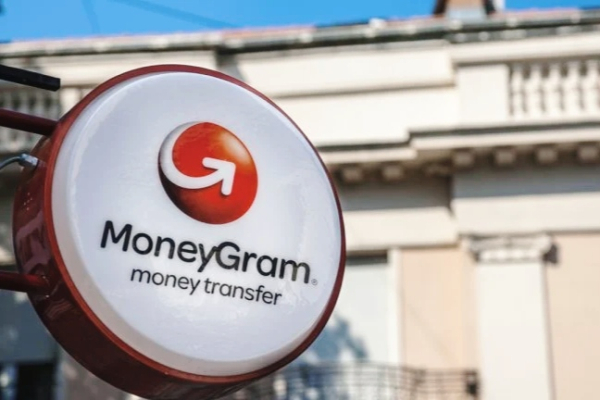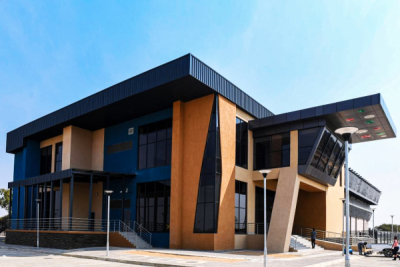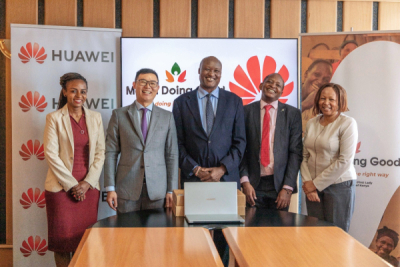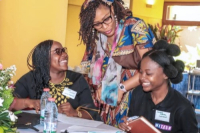Cryptocurrency and blockchain adoption is growing rapidly around the globe. To stay relevant in the market in such context, global fintechs are committed to expanding their services and bridging the gap between fiat and digital currencies.
On Tuesday, September 26, US financial services company MoneyGram announced plans to launch its digital wallet, which enables conversion to fiat currency, next year.
The wallet, which will officially debut in the first quarter of 2024, will enable consumers worldwide to leverage stablecoin technology to seamlessly switch between fiat and digital currencies or the other way around, all via Moneygram.
"Our vision to connect the world's communities, by empowering our customers through innovative financial solutions, takes another step forward today. [...] We're thrilled to have the vision, strategic plans, innovative technology, and expansive retail network in place to continue offering consumers access to the digital economy, but now further backed by our global reputation for speed, efficiency, and trust," said Alex Holmes, MoneyGram CEO.
The launch of Moneygram's crypto wallet is part of a partnership signed with the Stellar Development Foundation. The agreement became effective last year, with the launch of an initial service aimed at offering a bridge between cash and cryptocurrency. The service has been extended to eight digital wallets on the Stellar blockchain, offering consumers the ability to make withdrawals in over 180 countries and cash-ins in more than 30 countries worldwide.
As such, the new non-custodial wallet will use the Stellar network and MoneyGram's fiat transfer services to facilitate instant transactions. It will be a “zero-fee service” until June 2024, redefining cross-border payments and giving MoneyGram customers new ways to send and receive money.
Samira Njoya
Through Voyc AI, his client management compliance research company, he offers companies the possibility to supervise customer interactions and improve customer experience.
South African Matthew Westaway (photo) is the CEO and co-founder of Voyc AI, an Amsterdam-based start-up that uses artificial intelligence to analyze telephone conversations between companies and their customers. Through that company, he helps companies meet compliance standards and improve customer experience.
The CEO graduated from the University of Cape Town with a master's degree in computer vision and photogrammetry engineering in 2015. Matthew Westaway is driven by the vision of securing trust between companies and their customers by ensuring consistent quality and care in every interaction. In 2017, together with his friend Lethabo Motsoaledi, he came up with the idea of creating Voyc AI, after noticing the difficulties companies were experiencing in manually listening to and analyzing recordings of interviews with their customers. The project was launched the following year.
Since then, the former beneficiary of the Google for Startups Accelerator Africa program has attracted dozens of call centers in various regulated sectors in South Africa and England. The startup enables them to reduce compliance risks, improve operational performance, measure customer satisfaction, and identify customer vulnerabilities.
In September 2023, the entrepreneur was selected for ScaleNL Accelerator West Coast 2023, a 12-week immersive program designed to help startup founders enter the US market.
Prior to Voyc AI, the entrepreneur co-founded 3D Power, a company specializing in 3D printing, in 2014. In 2016, he also co-founded Hello Baby Prints, a startup specializing in baby technology, known for its 3D ultrasound printing product, Hello Baby 3D Prints. Matthew Westaway also co-founded Motsoaledi & West, a design-led innovation agency, in 2017.
Melchior Koba
Africa CEO Forum, in partnership with Ecobank Côte d'Ivoire, will organize the forum “Invest in Côte d’Ivoire’s Digital Economy” (Invest in Côte d’Ivoire – Economie numérique) next October 5 in Abidjan.
According to an official press release, the event aims to highlight the investment opportunities offered by the country’s digital sector.
Botswana Fibre Networks (BoFiNet) is due to receive its data center, built by a Chinese company, in October, according to the Chinese news agency Xinhua.
Called the Digital Delta Data Center (DDDC), it is located in the Gaborone-based Botswana Innovation Hub. The Tier 3 data center spans over 1,000 square meters with the ability to house around 400 bays. It will enable Botswana to assume data sovereignty and facilitate its ongoing socio-economic transformation.
With digital transformation accelerating across Africa, it is now crucial to build the continent’s digital skills. In Kenya, private and public stakeholders are multiplying partnerships for that purpose.
Last week, MaMa Doing Good, a Kenyan NGO headed by First Lady Rachel Ruto, announced a memorandum of understanding with Huawei to provide digital literacy training to some 14,000 women groups in the country.
The partnership between the two institutions encompasses several key areas, including bridging the digital divide, improving digital skills, advocating for digital literacy, and communicating and documenting the program and its impact.
“We are thrilled to join forces with MaMa Doing Good to empower women with the digital skills they need to thrive in today’s world. Through this collaboration, we aim to bridge the digital divide and create a brighter future for women in Kenya,” said Steven Zhang, Deputy CEO at Huawei Kenya.
For MaMa Doing Good, the new partnership “symbolizes a shared commitment to building an equitable society where every individual, especially women, can lead lives that are not just happy and fulfilled, but profoundly transformed. It resonates deeply with Kenya’s Vision 2030, underlining the paramount importance of digital literacy and economic empowerment” on Kenya’s roadmap to progress.
According to John Chumo (photo, center), CEO of MaMa Doing Good, investing in women's economic empowerment will pave the way for gender equality, poverty eradication, and inclusive economic growth. Digital equipment and skills will be a catalyst for change that will profoundly improve their lives, he believes.
Samira Njoya
In some regions, in Africa, access to medicines can prove challenging. Startups operating in the distribution of pharmaceuticals are interesting alternatives for people living in those regions.
Afia Pharma is a digital solution developed by Rwandan firm Afia Group Ltd. It enables users to purchase pharmaceutical products online from the comfort of their homes. The Kigali-based start-up was founded in 2020 by Biganza Papy.
We are “on a mission to make quality medications accessible, available, and affordable to billions of people across Africa, to ensure that everyone has access to medicine at any time and everywhere,” Afia Pharma stated on its website.
Through its mobile apps –Android and iOS apps–, users can create accounts and purchase pharmaceuticals, from antivirals, vitamins, and antimalarials to anti-inflammatories.
To order on Afia Pharma, users need to simply search for the products they are looking for, add them to their cart, select the delivery option, and confirm the order. Users can upload their prescriptions for products that require so.
Afia Pharma accepts most electronic payment methods, such as credit cards. To help users take their medications as prescribed, Afia’s mobile app includes a reminder option.
In 2023, the healthtech solution was selected to join the second cohort of the pan-African Investing in Innovation (i3) program, supported by the Bill & Melinda Gates Foundation and Microsoft, among others. This selection entitles it to $50,000 in funding to accelerate its growth across Africa.
Adoni Conrad Quenum
The innovation center WETECH contributes to the empowerment of women and girls in the digital sector. It demonstrates that women can be key players in social innovation and sustainable development in Africa.
WETECH (Women in Entrepreneurship and Technology) is a Cameroonian innovation center that aims to promote tech entrepreneurship and innovation among women.
Founded in 2015 by Crescence Elodie Nonga, a seasoned entrepreneur, WETECH aims to create a network of dynamic women leaders by providing access to opportunities and resources that will help empower women through entrepreneurship and technology.
The center designs and develops coaching and mentoring programs for African girls and women. It also offers them training in entrepreneurship and technology. Among the programs organized by the center is WETECH WILE, which detects, trains, and supports high-potential women entrepreneurs to support their growth and access to investments.
The center also offers the WETECH WIC (Women in Code) program to teach web and mobile development to women over the age of 18. With the support of the Canadian High Commission in Cameroon, WETECH is developing the FundHer program, which aims to provide women with resources to help them improve their access to financial products and opportunities.
The latest program it launched is the #eSkills4Girls initiative, which has already enabled 115 young Cameroonian girls to learn computer coding and web development. Present in Cameroon, Senegal, and Togo, WETECH has already supported over 30 projects, organized more than 10 programs and activities, trained over 600 women, and impacted more than 2,500 women.
In 2022, the center won the Joint Innovation Challenge, an international competition organized by the United Nations Population Fund (UNFPA) in collaboration with the World Intellectual Property Organization (WIPO), the International Telecommunication Union (ITU) and the International Trade Centre (ITC).
Melchior Koba
With the ongoing digital transformation, investments are pouring into Africa to guarantee quality internet connection for populations. Over the past three years, new telecoms infrastructures have been commissioned for this purpose.
Demand for high-speed Internet services in Africa has been rising since 2020. This need is currently having a direct impact on the continent's transmission capacity, which has recorded the fastest compound annual growth rate (CAGR) in the world over the past three years, indicates the Broadband Commission of the International Telecommunication Union (ITU), in its report "The State of Broadband 2023 Digital Connectivity: A Transformative Opportunity."
Between 2020 and 2023, a dozen new submarine cable systems were commissioned on the continent, boosting total available bandwidth by more than 70 terabits. In addition to cables such as the South Atlantic Inter Link, Orval, METISS, DARE1, EllaLink, Maroc Telecom West Africa, Equiano, 2Africa, etc., thousands of kilometers of terrestrial fiber optic cable have also been deployed by suppliers such as Liquid Telecom. Added to this are the data capacities of national and international satellite communication systems such as Eutelsat, YahClick, Intelsat, Starlink, OneWeb, etc.
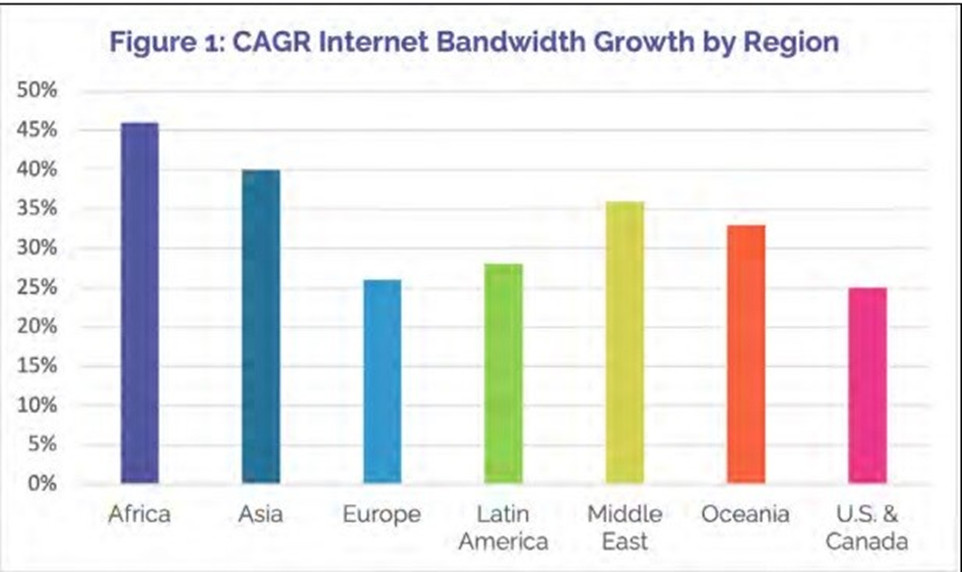
Source: Broadband Commission
In its June 2020 Mobility Report, tech company Ericsson reported that in sub-Saharan Africa, home to more than half the African population, monthly internet trafic per smartphone was 1.9 gigabytes in 2019. By June 2022, this monthly traffic had climbed to 4.7 gigabytes. Ericsson estimates that this growth in demand volume will reach 19 GB by 2028, for individual consumers alone. However, the rapid annual growth in high-speed transmission capacity does not always benefit all African populations, even though 83% of them are covered by a telecoms network (49% by 4G and almost 30% by 3G), according to the ITU. The Internet access rate is only 33% (87% in Europe, 81% in the USA, 61% in Asia-Pacific), despite the significant potential for high-speed connectivity. A number of obstacles are still holding back the full exploitation of the various Internet investments made by governments and service providers. These include the high cost of entry-level broadband services. They are still well above the threshold set by the Broadband Commission: less than 2% of monthly gross national income per capita.
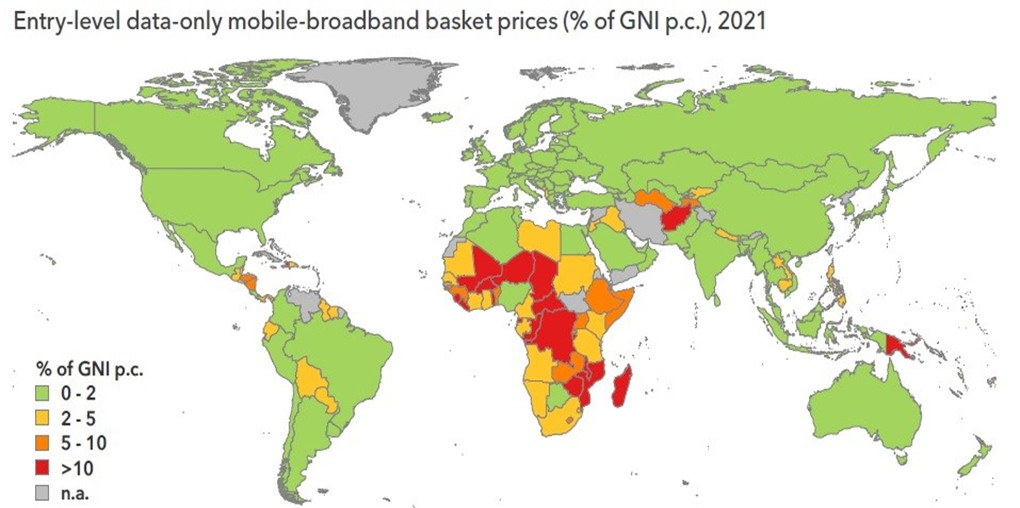 Source: UIT
Source: UIT
The cost of internet-enabled phones is another obstacle. In its study "To Luxury To Lifeline. Reducing the cost of mobile devices to reach universal internet access" covering 70 countries worldwide, the Alliance for Affordable Internet (A4AI) drew up a heat map revealing the markets where the price of a smartphone is most affordable. Access to computers is also expensive. Only 1% of the African population is connected to fixed broadband at home (35% in Europe, 23% in the USA, 17% in Asia-Pacific), out of the nearly 2.5 million km of fiber optic cable already deployed on the continent.
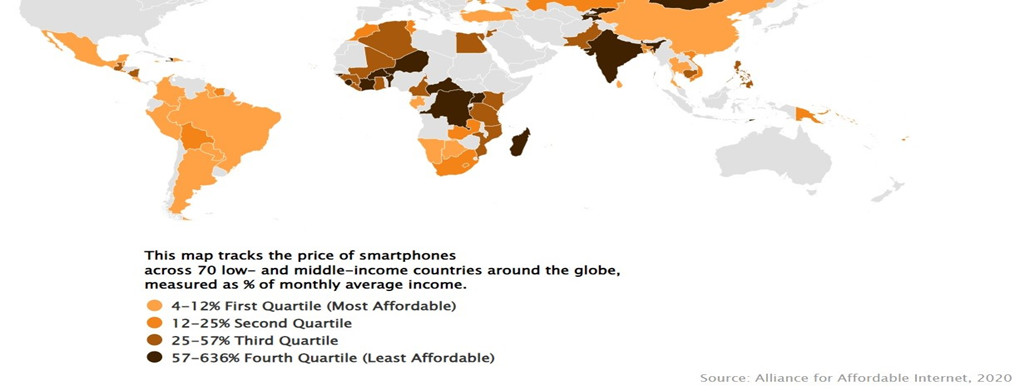 Source: Alliance for Affordable Internet
Source: Alliance for Affordable Internet
According to the ITU, the Internet is currently an undisputable catalyst for economic and social development. The UN agency states that improving mobile and fixed broadband penetration rates by 10% would add 2.5% and 1.5 respectively to gross domestic products (GDP).
Muriel Edjo
After enabling Nigerian startups to raise capital on the exchange, the NGX is going a step further with the federal government’s approval.
Nigerian authorities want local start-ups to be listed on the Nigerian Exchange Limited (NGX), the country's main stock exchange. This was stated by Bosun Tijani, Nigeria's Minister of Communications, Innovation and Digital Economy, at a technology event entitled "Invest in Africa's Future - Let's talk about exits" held last week in New York, on the sidelines of the United Nations General Assembly.
The aim is to stimulate the listing of startups on the NGX Technology Board index. "We want to prioritize the ability of our technology companies to export products and we are targeting Africa first and then eventually start selling to the rest of the world," Minister Tijani explained.
This decision is in line with the country’s plan to diversify its economy, therefore reducing its high dependence on oil revenues by capitalizing on its very buoyant and dynamic tech sector. According to Partech Africa, Nigerian startups captured $1.2 billion of the $6.5 billion raised in Africa in 2022. In 2021, they captured $1.8 billion of the $6 billion, against $307 million of the $1.43 billion in 2020 and $747 million of the $2 billion in 2019.
Apart from being the country whose startups attract the most funding in Africa, Nigeria also hosts four of the eight unicorns on the continent. Those unicorns are namely Chipper Cash, Flutterwave, Interswitch, and Opay. Flutterwave co-founder Olugbenga Agboola, who took part in the event in New York, explained that his company would bank on the project and capitalize on the opportunities offered to evolve and bring more value to its customers and investors.
"We will continue to do a lot of work that makes us able to attract local capital and the day tech start-ups come to the exchange, we are confident that there would be a very good audience of investors that would want to own a bit of their shares. This is what we at NGX are doing by removing all barriers for that to happen," says Temi Popoola, Chief Executive Officer of NGX.
Adoni Conrad Quenum
In 2021, Starlink began negotiations to get the necessary authorizations to provide its satellite internet services in certain African countries. Pursuing the same objective, the company is partnering with African companies with converging ambitions.
Pan-African broadband connectivity provider Paratus announced on Friday, September 22 that it had signed an agreement to distribute Starlink's broadband Internet services on the African continent.
Under the terms of the agreement, Paratus will supply Starlink to customers across the continent as and when licenses are granted to Starlink in Africa. For the time being, Starlink will be available from Paratus in Mozambique, Kenya, Rwanda, and Nigeria, before being extended to other countries.
"This agreement aligns perfectly with our vision of transforming Africa through exceptional digital infrastructure and customer service. It means we can offer industry sectors – such as land and offshore energy, mining, hospitality, education, healthcare, agriculture, and more – the reliable and constant connectivity they need to flourish, no matter how remote they are," said Martin Cox, Paratus Group Chief Commercial Officer.
For Starlink, the new agreement is part of its expansion strategy to bring satellite broadband Internet services to every corner of the globe, including remote and landlocked areas hardly accessible for mobile operators' terrestrial networks.
In this way, the partnership between Paratus and Starlink should help to strengthen competition in the African Internet market and promote digital inclusion. According to a 2022 report by the International Telecommunications Union (ITU), in 2021, 33% of Africans used the Internet, compared with 63% for the global average. These figures have risen sharply in 2022 with the arrival of new telecom operators and the construction of new infrastructures in several countries.
Samira Njoya
More...
Electronic payment solutions provider Visa Inc. has officially inaugurated its new office in the Egyptian city of Cairo.
According to the company's press release, this further expansion demonstrates Visa’s commitment to supporting the company's financial institution and merchant clients, local government partners, investments, and local communities in ongoing efforts to drive the digitization of the payments landscape.
E-health platform "Expertise", which promotes digital health in Africa, and its partners recently issued a call for applications for the creation of a Committee of Experts in Digital Health for Africa (CEiSNA). The initiative aims to bring together digital health stakeholders to develop innovative strategies and solutions for the future of digital health in Africa.
Individuals, start-ups, companies, universities, and healthcare institutions involved in this sector are invited to submit applications, by November 9, 2023, at 23:59 GMT. To apply, they simply need to fill out this form.
The solution was co-funded by a Nigerian-born entrepreneur who spent the bulk of his professional career working for international IT firms.
WallX is a fintech solution developed by a Nigerian startup of the same name. It enables users, both individuals and corporate entities, to send and receive money, receive payments, and settle online transactions. The startup, based in Lekki in Lagos State and New York in the USA, was founded in 2020 by Richmond Ogigai and Subomi Jegunmah.
"I had seen firsthand the experiences of small business owners when it comes to payments and how their businesses eventually die out because they don’t have the basic tools or knowledge to build out their businesses. [...] Things like smart digital payment tools, record keeping, hiring, and sales management, are still very much done in a very manual way, and they end up running your business down," says Richmond Ogigai.
The solution features a mobile application accessible for Android and iOS devices. Once downloaded, users must create an account to access the various services it offers. Both individuals and companies can generate payment links as well as PIN codes to easily collect merchant payments or gift vouchers, pay electricity bills, buy airtime, or make monetary contributions such as participatory financing.
Since its launch, the Android version of the mobile application has already been downloaded more than a thousand times. WallX has been selected for the Spring 2023 cohort of New York accelerator Starta. It is also one of the 12 startups selected for the second cohort (2023) of the Fast Accelerator program supported by Microsoft.
Adoni Conrad Quenum
After launching two businesses that unfortunately failed, he turned to technology, offering a fintech solution that enables small and medium-sized businesses to manage their accounts and access financial services.
Emmanuel Emodek (photo) is a Ugandan entrepreneur and the co-founder and CEO of ChapChap, a startup that helps small and medium-sized businesses keep their accounts and access financial services.
After graduating from high school, he opted out of university to help his mother and brothers earn a steady income. For that purpose, he launched two successive businesses which unfortunately failed. Then he met one of his former school teachers, Monica Kiconco Asiimwe, who asked him to come up with an idea for a solution that would help entrepreneurs.
"Monica saw something in me. She told me that she knew I could think up some kind of solution that would help small business owners stay afloat," Emmanuel Emodek indicated in 2019.
Following his former teacher’s advice, in 2016, he launched ChapChap. His co-founders in that endeavor are Monica Kiconco Asiimwe and James Alituhikya, a software engineer and at the same time one of Monica’s former students. ChapChap is an app that enables entrepreneurs to manage their inventory, sales, expenses, and profits and also gives them access to loans, insurance, and markets.
Since its launch, ChapChap has enjoyed remarkable success. In Uganda, the company already offers its services to over 20,000 micro, small, and medium-sized enterprises. In 2019, its CEO was chosen from among eight entrepreneurs to receive the HRH The Prince of Wales Young Sustainability Entrepreneurs Prize awarded by Unilever and Cambridge University's Institute for Sustainability Leadership.
Before becoming an entrepreneur, Emmanuel Emodek worked as a cabin crew for Air Tanzania Company Ltd from 2005 to 2010. Between 2007 and 2012, he was an independent distributor for QNET Ltd, a lifestyle and wellness company that uses a direct sales business model to offer a wide selection of products.
Melchior Koba


